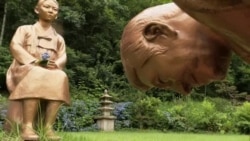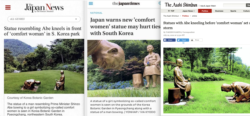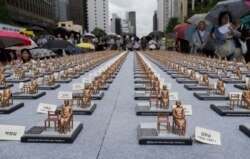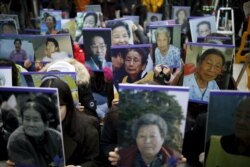Two new statues placed at the Korea Botanical Garden were meant to memorialize a disturbing chapter in Japanese and South Korean history: The abuse of Korean “comfort women,” who for decades were forced by the occupying soldiers of Imperial Japan to provide them with sex. (The garden's web site was recently offline.)
The memorial, titled “A Heartfelt Apology,” was unveiled on July 26 with little fanfare. The set of two statues depicts a girl sitting on a bench and, in front of her, a man on his knees bowing deeply to the ground. But what happened next reopened an unhealed rift between the countries.
Some observers claimed the male figure resembled Japan’s Prime Minister Shinzo Abe. The speculation began on social media, but it soon spread to mainstream news media in South Korea, and then to Japan.
Major Japanese news networks, such as Asahi Shimbun, Tokyo Shimbun, and Yomiuri Shimbun, dubbed the statues the “Apologizing Abe Statue.” Asahi reported that the statues signaled South Korea’s intention to “reignite a furor with Japan” over wartime issues.
Tensions heightened further when Japanese government officials intruded. On July 28, Japan’s chief cabinet secretary, Yoshihide Suga, addressed the controversy, saying the statues were “unacceptable on the basis of international courtesy … If the report is true, it will have a decisive impact on Japan-South Korea relations.”
Claims that the statue depicts Abe are false.
Kim Chang-ryul, the head of Korea Botanical Garden, issued a strong denial, adding that the statue was just “one of many statues at the botanical garden.” The garden is a popular tourist attraction located in Pyeongchang, north of Seoul. It is privately run and has no government affiliation.
“The man could be the girl’s father, or maybe former (Japanese) Prime Minister Hashimoto, or just someone who feels bad about what the comfort women went through,” Kim explained.
“I was just thinking it would be nice to have something meaningful,” he said. “There was no political backing or purpose whatsoever. I did not expect such controversy to arise from this.”
South Korea and Japan have had a rocky relationship over the years. Imperial Japan ruled Korea for 35 years, and the countries have disagreed over the settlement of alleged war crimes committed by the Japanese.
Perhaps the most fiercely argued matter of all – more so from the Korean side – has been the matter of the comfort women, whose numbers have been estimated by the United Nations at more than 200,000.
In 2015, under Abe’s government, South Korea and Japan reached an agreement to “finally and irreversibly resolve” this issue, when Japan agreed to pay 1 billion yen (about $8.3 million) to surviving victims.
The deal has been widely criticized for alienating the survivors, who filed a lawsuit against the South Korean government in 2016. Although the case was dismissed, the court stated that the agreement “certainly lacked transparency or was deficient in recognizing ‘legal responsibility’ and on the nature of the one billion yen provided by the Japanese government.”
South Korean President Moon Jae-In has rescinded the agreement, telling Abe that "the reality is the majority of [Koreans] cannot emotionally accept the comfort women agreement." South Korea officially pulled out in 2018.
When asked to comment on “A Heartfelt Apology,” South Korea’s Foreign Ministry Spokesperson Kim In-chul said that if true, the statue would degrade “international comity concerning foreign leaders.”
South Korean commentators have said the statues, built on private property using private funds, should not be subject to international comity.
The Korean Botanical Garden has canceled the unveiling ceremony for “A Heartfelt Apology,” which had been planned for Aug. 10. In addition, the Garden said it has no plans to remove the statues.










